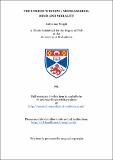The unseen window - 'Middlemarch', mind and morality
Abstract
Middlemarch is the novel at the centre of this thesis. George Eliot's writing, and Middlemarch in particular, is the paradigm of what has come to be known as Classic Realist fiction. In reading Middlemarch, it seems, one is introduced to a fictional world. The characters are psychologically complex, and they are presented with moral and social problems which are created and discussed with subtlety and intelligence. Until recently, critical assessment of Middlemarch has focussed on evaluation of Eliot's achievement in just these terms. The thesis begins with a question, how, and indeed is it possible for a novel to depict a fiction in this way? The introductory chapter proposes an answer to this question which opens the way to a radical critical appraisal of the status of Middlemarch as a psychologically realistic novel. The scope of the thesis is in one sense very narrow: it is on the ways in which George Eliot creates the moral psychology of her characters, and the ways in which she develops and sustains our interest in their motives, their emotions and in general their mental states and processes. My suggestion is that the language Eliot uses is deeply coloured by her commitments in the Philosophy of Mind. The argument will be that in order to take Eliot's fiction to be psychologically realistic, we are committed to sharing her unacceptable philosophical presuppositions. The second chapter of the thesis is a discussion of Eliot's novella The Lifted Veil. This is an odd piece of fiction, both technically and in subject matter. It does not fit easily into the Eliot canon, and until recently it has received little attention. The purpose of Chapter Two is partly to redress that balance but more to diagnose Eliot's philosophical commitments. The eerie fantasy of unnatural mind-reading reveals Eliot's ideas in a very explicit way. My suggestion is that in the struggle to make this fantasy coherent, a picture of the mind emerges which is both seductive and ultimately nonsensical. Narrow as the focus is, the arguments to establish my point take us deep into Wittgenstein's later Philosophy. The fundamental insight of Wittgenstein's work on the philosophy of mind was that in order to understand how it is possible to talk meaningfully about mental states and processes, we must resist the seductive, ultimately nonsensical picture seemingly imposed upon us by the grammar of ordinary psychological remarks. And if those arguments are thought to be convincing, the thesis has important negative implications for at least one important perennial question in the philosophy of aesthetics. The starting point of this thesis takes seriously the idea that novelists can, and ought to, examine themes of deep human significance. The larger goal of this piece of work has been to open up a line of enquiry which might examine, from within the Analytic tradition in philosophy, the extent to which that task is feasible. I have sought to establish an important connection between the creation of the moral psychology of fictional characters, and Wittgenstein's later work in the philosophy of mind. I believe that the examination I have conducted of the way issues in the philosophy of mind, especially those treated in the Philosophical Investigations, bear on the way Eliot writes places much of the psychological language of Middlemarch in a new light, and discloses certain quite general limits on what is possible in creating fictional minds.
Type
Thesis
Collections
Items in the St Andrews Research Repository are protected by copyright, with all rights reserved, unless otherwise indicated.

